Why Do My Legs Hurt So Much After I Do Squats?
Author:
Reviewed by:
(21 years of Oly Lifting experience)
Unlock your full potential by engaging with our experts and community! Have questions about your fitness journey or looking for expert advice on weightlifting techniques? Don’t hesitate — leave a comment below and David Sasha Schulz will provide a personalized answer and insights to help you reach your goals.
Torokhtiy is reader-supported. Some links are affiliate links, and we may earn a commission at no extra cost to you. See our disclosure page for details.
You’ve completed a leg day training session and felt great in the gym, but when you return home, you ask yourself, ‘why do my legs hurt so much after I do squats?’.
Squats are a popular exercise with countless benefits such as strengthening the lower body and boosting overall athleticism, but getting sore thighs from squats is a common problem many gym-goers face.
So, why do my legs hurt so much after I do squats?
Why do my legs hurt so much after I do squats is a common question and the answer can be overuse, injury, improper form, or DOMS. Mild discomfort or soreness from squats is normal, but intense leg pain should be investigated by a health professional to rule out injury.
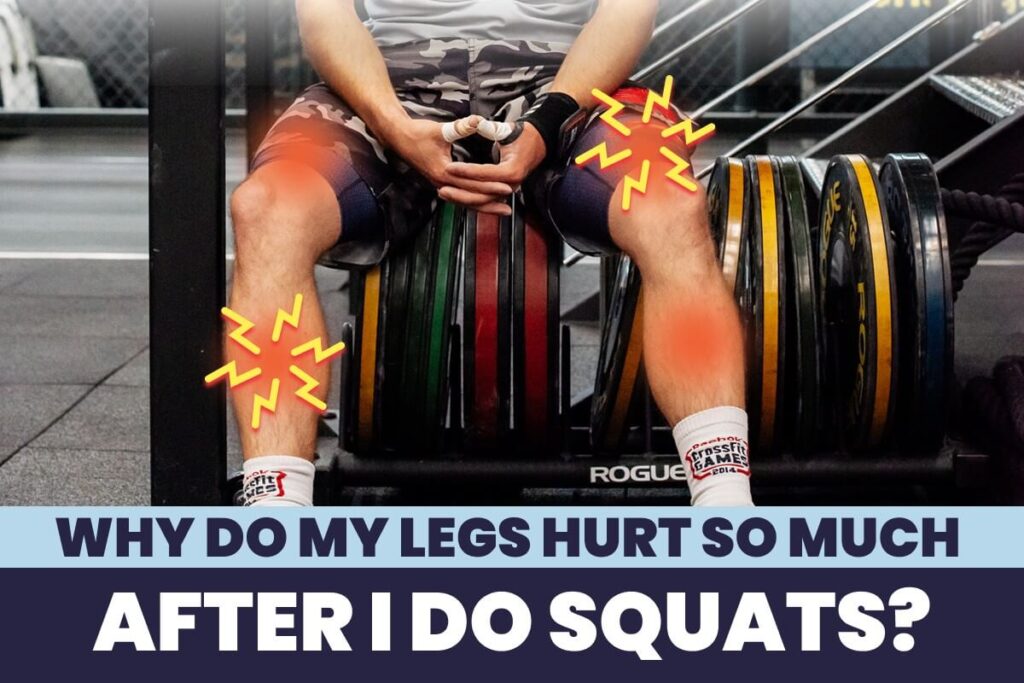
Why Do My Legs Hurt So Much After Squats?
A variety of muscles are used when performing squats, and it’s this collaboration of different muscles that makes the squat a compound exercise.
Primarily, the quadriceps, gluteus maximus, and hip adductors are used when squatting, alongside hamstrings, hip flexors, and calves, so it’s no surprise if your thighs hurt after squats!
Our legs go on quite a journey when we squat, with quadriceps and gluteals taking center stage for both front and back squats. With correct form and variety in workouts, you shouldn’t feel excessive pain, but it is common to have sore quads after squats since the quadriceps play a vital role in the exercise.
How Long Can Legs Hurt After Squats?
Generally, if your legs hurt after squats and you’re struggling to go about your daily life, feeling intense pain when walking, going up the stairs, or squatting down to get into your car, you’ve likely pushed things a little too hard in the gym.
If you have some mild discomfort in your legs but it’s not stopping you from performing daily activities and is easing as time goes by, you probably don’t need to worry.
Legs can hurt for various amounts of time after performing squats, but if you find your quads are still like bricks several days after your session, it’s a good idea to seek advice from a medical professional. Mild to moderate pain and soreness after exercise is normal, provided it’s within the window of 24-72 hours post-workout.
DOMS, or delayed onset muscle soreness usually lasts for about 48-72 hours post-workout, when the body has been pushed particularly hard and isn’t used to such intensity.
If you can’t walk after squats and it’s been longer than this period, you may have an injury. Usually leg pain after squatting should lessen with time and rest, but if this isn’t the case and your legs are extremely painful several days after your workout, it’s best to look into the potential causes of your leg pain.
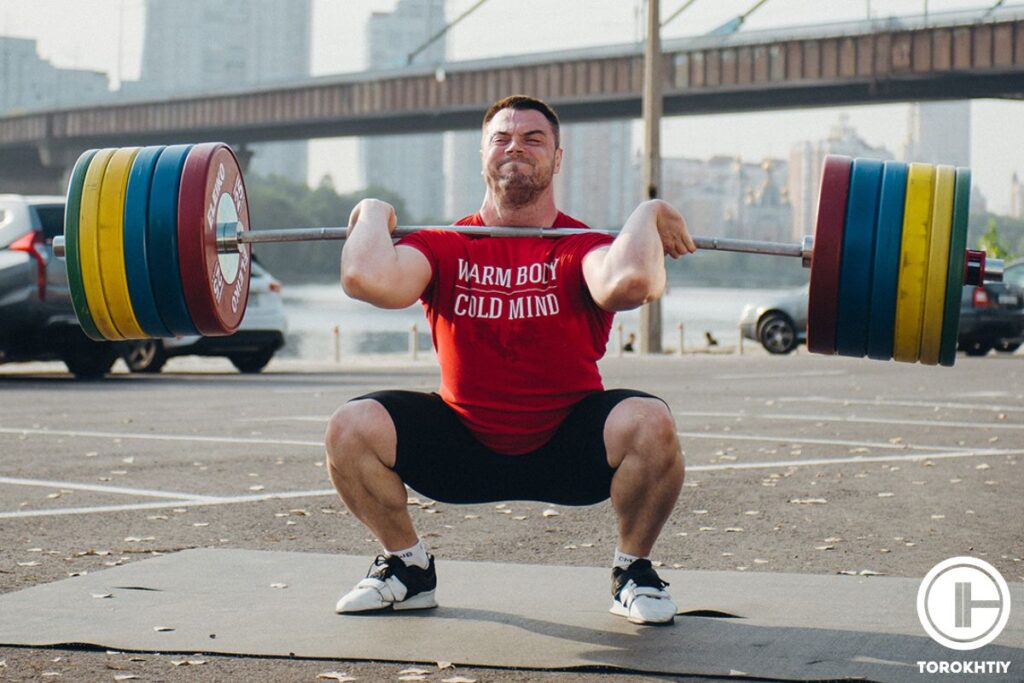
3 Causes Of Leg Pain After Squats
Getting to the root cause of sore thighs from squats is the best way to figure out if you’ve got sore quads after squats, DOMS, or an injury that will need to be looked at and diagnosed by a professional.
If your leg pain started to arise after you completed a heavy leg day, you may just be facing normal muscle soreness that should calm down after a couple of days of rest and recovery.
Follow us!
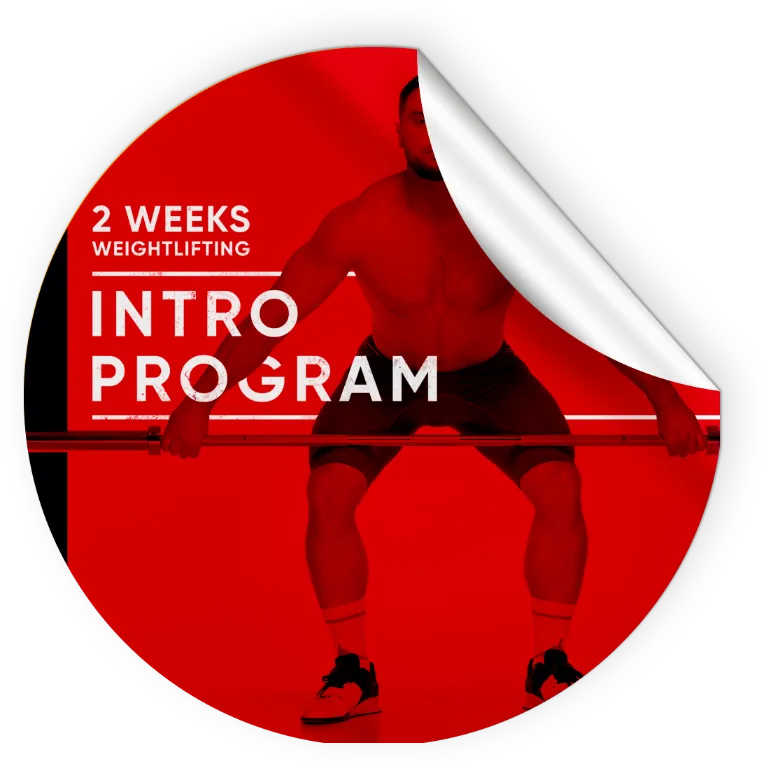
Free!
Get a 2-week Weightlifting Program as a bonus for the subscription to kickstart your training plan!

Free!
1. Overuse
Performing the same exercises time and time again, targeting the same muscles without proper recovery is a gateway for overuse. Compound exercises, while beneficial in the right amount, tend to be heavier and more fatiguing to the primary muscles as well as systemically.
As squats stress primarily the quadriceps (front of the thigh) muscles, it’s easier to overtrain with squats than isolation exercises. This could be the answer to why your quads hurt after squats.
2. Incorrect Form
Correct form is key across every exercise and activity you complete in the gym from benching and pressing to deadlifts and squats. Performing squats with incorrect form can mean putting excessive pressure on the knees and overloading ligaments.
Using too much weight or progressing too quickly in volume or intensity can cause excessively sore quads after squats. When squatting, it’s essential to have correct form, to avoid injury and see better results over time.
Tips From the Champ
Whether you’re a novice lifter or someone with several years of training under your belt, it’s never a bad decision to take a closer look at your form. Letting form slip can be easy, especially over time, so grab a friend, PT, or video yourself squatting and see if you’re lifting correctly.
Olympic Weightlifting Champion
3. Injury
Many gym-goers often wonder ‘why do thighs hurt after squats’ and if you’ve ruled out regular DOMS, overuse and incorrect form, you may be dealing with an injury. Musculotendinous ruptures or tears along with other injuries can occur when squatting, though these conditions should be diagnosed and treated by a health professional.
If you’re experiencing prolonged pain after squatting, it’s best to press pause on your training until you can better understand the pain you’re feeling and why it’s happening.
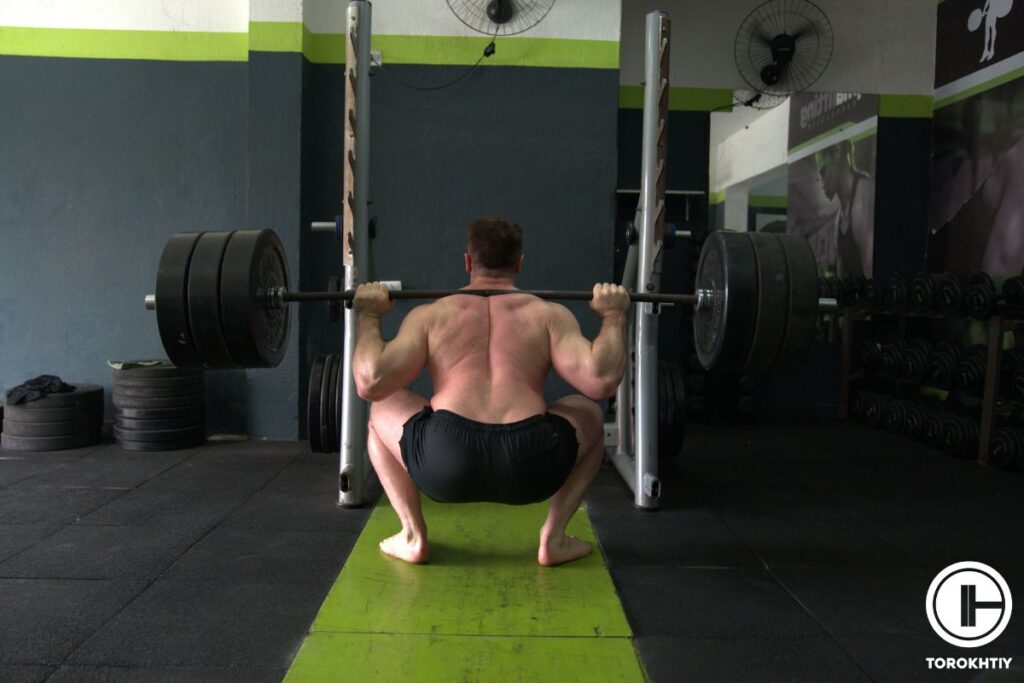
What To Do To Reduce Leg Pain After Squats?
Experiencing pain after a training session can be relieved in a few different ways. Thankfully, many of these are the answers to how to get rid of sore legs from squats. Therefore, implementing them into your post-workout routine can have you seeing great results and feeling rested to tackle another heavy session soon.
1. Quality Rest
Completing a quality training session is only part of the body’s journey to grow stronger. Small tears are created in the muscles during weightlifting, and when we begin to rest, that’s where the muscles heal, develop, and grow. To do this the body needs to be well-fed and rested, so after you’ve completed squats, take it easy and get good quality sleep.
Tips From the Champ
Getting enough rest after training is essential for your muscles and connective tissues to heal and repair themselves. This doesn’t just mean sitting down all day, but also includes fueling the body with good nutrition and hydration, continuing with low-impact light exercise/activity, and most of all, getting a restful night’s sleep.
Olympic Weightlifting Champion
2. Active Recovery
You may be tempted to sit around all day if your thighs hurt after squats but it can be beneficial to mix passive and active recovery to get the best results. Active recovery involves completing gentle exercises such as walking or cycling to increase blood circulation aiding in the rebuilding of muscles.
Including both passive and active recovery is an ideal way to keep your muscles moving, pumping blood all around your body, but also giving it time to heal and recover.
🔻GET A FREE PROGRAM DEMO: 12 Week Squat Program by Oleksiy Torokhtiy
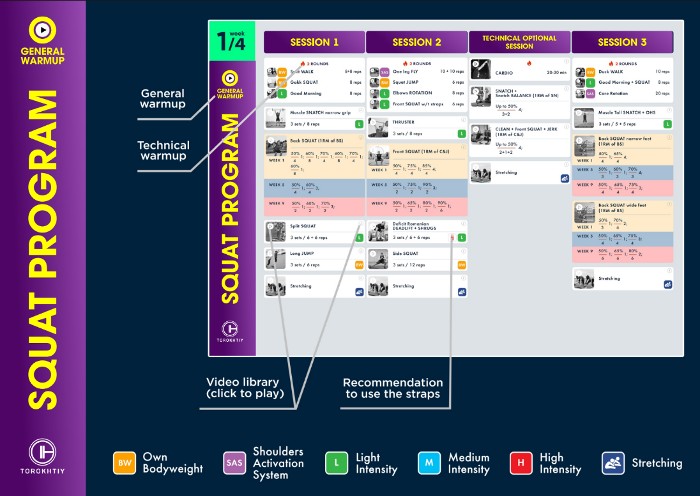
Do you want to double your squat strength? In just 12 weeks, you’ll be able to boost your squat results.
Enter your details and get a free demo (1 free week) of the squat program straight into your inbox.
3. Nutrition
It’s no secret our bodies love proper nutrition and hydration, and both of these can be contributing factors to recovery after squats. To function at its best, the body requires a range of nutrients, vitamins, and minerals, one example being protein.
Consuming enough quality protein before (maybe during) and after a workout allows muscle protein synthesis to reach high levels, thus aiding in muscle recovery and potential reduction of muscle pain.
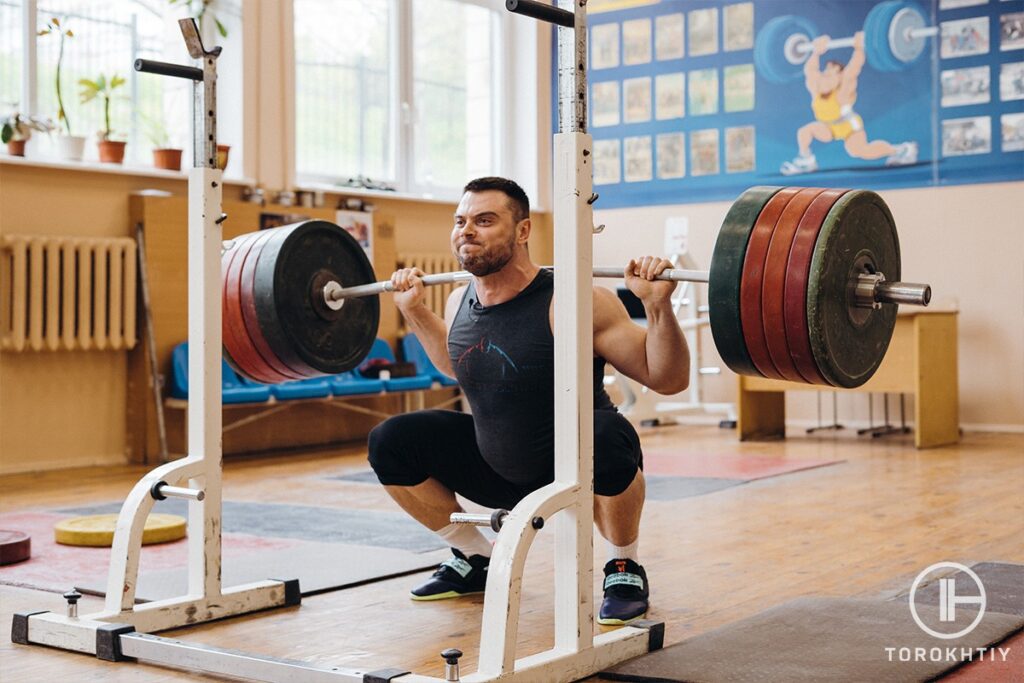
FAQ
Is It Normal For Legs To Hurt After Squats?
Feeling mild discomfort and soreness in your legs after squatting is normal, as many muscles are working during the exercise. It’s common to wonder ‘are squats supposed to hurt the front of your thighs’ and the answer is yes, as the quadriceps are a key muscle involved in the squat.
Quality rest, active and passive recovery, and good nutrition can contribute to a reduction in leg pain after squats.
Why Do My Legs Feel So Weak After Squats?
Improper recovery can lead to legs feeling weak after squats, so post-workout, be sure to fuel your body and give it the rest it deserves. Staying hydrated, eating well, and getting adequate rest should help your legs feel stronger and ready to tackle another session.
Should I Do Squats If I’m Still Sore?
If the soreness you’re feeling is mild and isn’t preventing you from doing regular daily activities, it should be fine to squat with some leg soreness. If you are goping to squat while sore, however, it should probably be a lighter or lower volume session than the previous one so you do not overreach.
Correct form should always be a priority, so if you’re in too much pain to perform squats properly, it’s best to do a different exercise or train a different part of your body. Your muscles may need longer to recover from your last squat session, so give them the time they need rather than pushing yourself to the max as this could potentially lead to injury.
Why Do Squats Hurt My Thighs Not My Bum?
Quadriceps are the main muscles working during a squat, and the gluteals play a lesser/variable role, depending on technique. To work the glutes well, you need to squat deep, which most people do not do. You can also squat with a wide stance (still as deep as possible) to work the glutes more.
You can also try some simple glute activation exercises before squatting can help get the bum fired up and ready to work. A resistance band glute activation warm-up can wake the glutes up and help you make a good mind-to-muscle connection so you can feel your bum working during squats.
Conclusion
If you’ve been asking “why do my legs hurt so much after I do squats”, and “how to get rid of sore legs after squats”, hopefully reading our blog has helped answer your questions.
Experiencing leg pain after squatting can be uncomfortable, especially when it’s prolonged, but exploring our tips and discussion of potential causes of squat leg pain should help shed some light on your situation.
Have you experienced leg pain after squatting? If so, what helped your recovery?
Also Read:
- Perfect Squat Hand Position in 5 Steps
- Is a 225 lbs Squat Good?
- Is 315 lbs A Good Squat: Decoding Gym Benchmarks
- Functional Fitness Injuries And How To Avoid Them
- 9 Harder Squat Variations To Try At Least Once
- 10 Best Squat Alternatives For Bad Back (CPT Recommended)
- Ideal Squat Bar Path Explained By Lifting Coach
Referenses:
- Sara Lindberg, Micky Lal, MA, CSCS, RYT, “7 Benefits of Doing Squats and 7 Variations to Try”, Healthline, https://www.healthline.com/health/exercise-fitness/squats-benefits#benefits (Accessed February 23 2024)
- Brian Sutton, MA, MS, CSCS, NASM-CPT, CNC, CES, PES, “The Muscles Used In Squats – Squat Biomechanics Explained”, NASM, https://blog.nasm.org/biomechanics-of-the-squat (Accessed February 23 2024)
- Jonathan Sinclair, Darrell Brooks, Stephen Atkins, “An examination of the hamstring and the quadriceps muscle kinematics during the front and back squat in males”, University of Central Lancashire, https://clok.uclan.ac.uk/17473/1/squat.pdf (Accessed February 23 2024)
- Peter Lewnard, PT, “What Is Normal Soreness Following a Workout?”, Mass General Brigham Wentworth-Douglass Hospital, https://www.wdhospital.org/wdh/services-and-specialties/orthopedic-care/blog/what-normal-soreness-following-workout (Accessed February 23 2024)
- Victor Bengtsson, Lars Berglund, Ulrika Aasa, “Narrative review of injuries in powerlifting with special reference to their association to the squat, bench press and deadlift”, National Center For Biotechnology Information,
https://www.ncbi.nlm.nih.gov/pmc/articles/PMC6059276/ (Accessed February 23 2024) - Rick Ansorge, “Rest and recovery are critical for an athlete’s physiological and psychological well-being”, UCHealth,
https://www.uchealth.org/today/rest-and-recovery-for-athletes-physiological-psychological-well-being/ (Accessed February 23 2024) - Luc J C van Loon, “Role of dietary protein in post-exercise muscle reconditioning”, National Center For Biotechnology Information, https://pubmed.ncbi.nlm.nih.gov/23765352/, (Accessed February 23 2024)
- All photos are made by our Torokhtiy Media Team
Why Trust Us?
With over 20 years in Olympic weightlifting, strength training, nutrition coaching, and general fitness our team does its best to provide the audience with ultimate support and meet the needs and requirements of advanced athletes and professional lifters, as well as people who strive to open new opportunities and develop their physical capabilities with us.
By trusting the recommendations of our certified experts in coaching, nutrition, and sports training programming, as well as scientific consultants, and physiotherapists, we provide you with thorough, well-considered, and scientifically proven content. All the information given in the articles concerning workout programming, separate exercises, and athletic performance, in general, is based on verified data.
The product testing process is described in more detail here.
Author: David Sasha Schulz
Doctor of Chiropractic, BSc Human Biology, CSCS
Strength coach (CSCS) – 10 years
Sasha is a Chiropractor and Kinesiologist practicing in Kelowna, BC, Canada. He has been practicing Chiropractic since 2019, integrating manual therapy, strength training and programming principles, and nutritional strategies to get his patients optimal results. He currently scratches the competitive itch in fitness, and the occasional endurance race, and plays golf and snowboards for fun. He has an interest in all strength and fitness-related sports.
Reviewed by: Oleksiy Torokhtiy
Olympic Weightlifting Champion, PhD in Sport Science
Best Results: Snatch – 200 kg,
C&J – 240 kg
Oleksiy Torokhtiy is a professional athlete boasting 20 years of experience in Olympic weightlifting. With multiple European and World titles under his belt, he has showcased his prowess in two Olympic Games (Beijing 2008 and London 2012). Upon concluding his illustrious career, Oleksiy dedicated himself to coaching. By 2022, he had conducted over 200 weightlifting seminars worldwide. He is the visionary behind an international sportswear and accessories brand known for its motto, “Warm Body Cold Mind.” Additionally, he is an esteemed author and the creator of a series of training programs and eBooks.


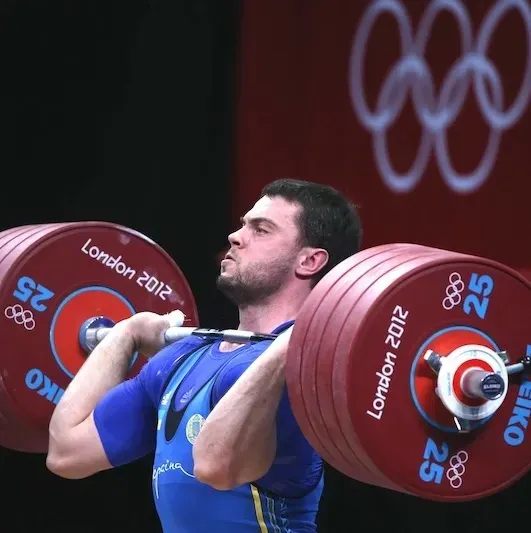


Still have questions after reading our article? Unlock your full potential by engaging with our experts and community! Don’t hesitate — leave a comment below and David Sasha Schulz will provide a personalized answer and insights to help you reach your goals.